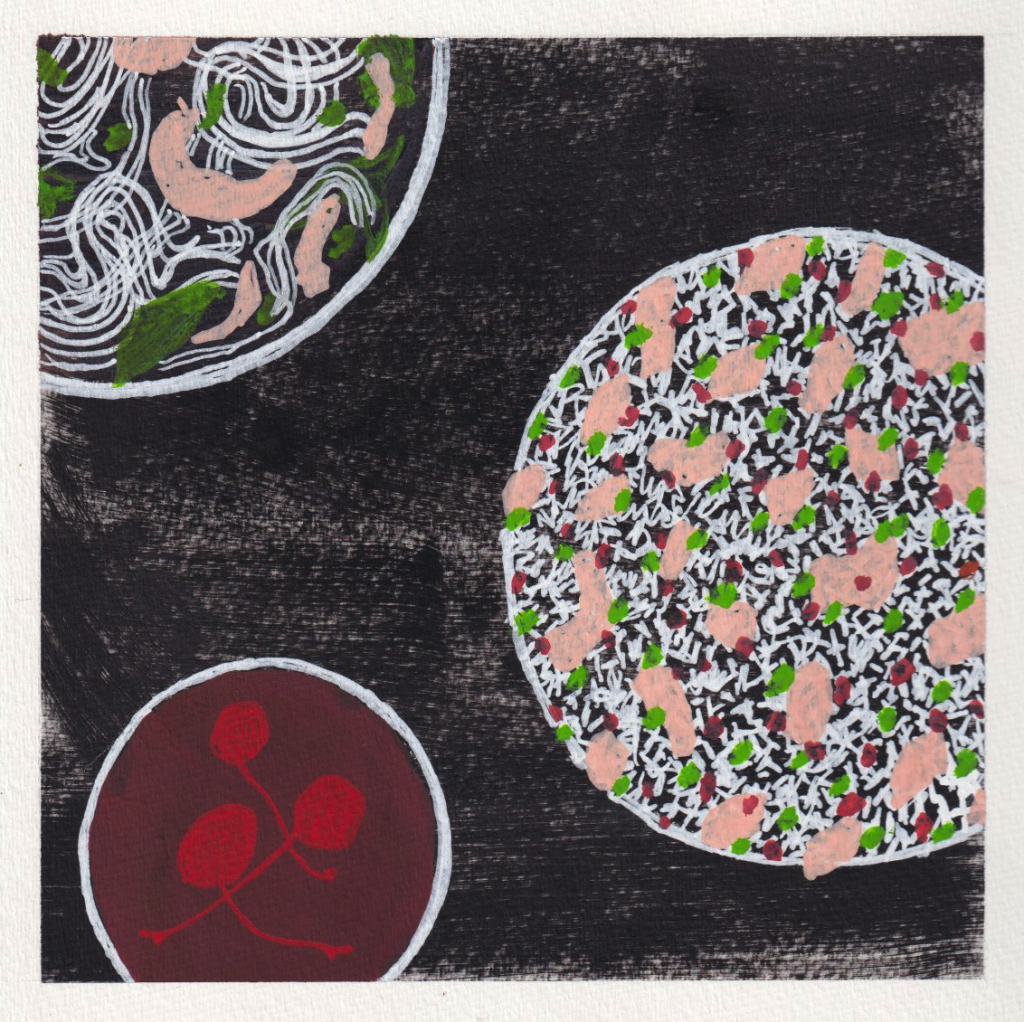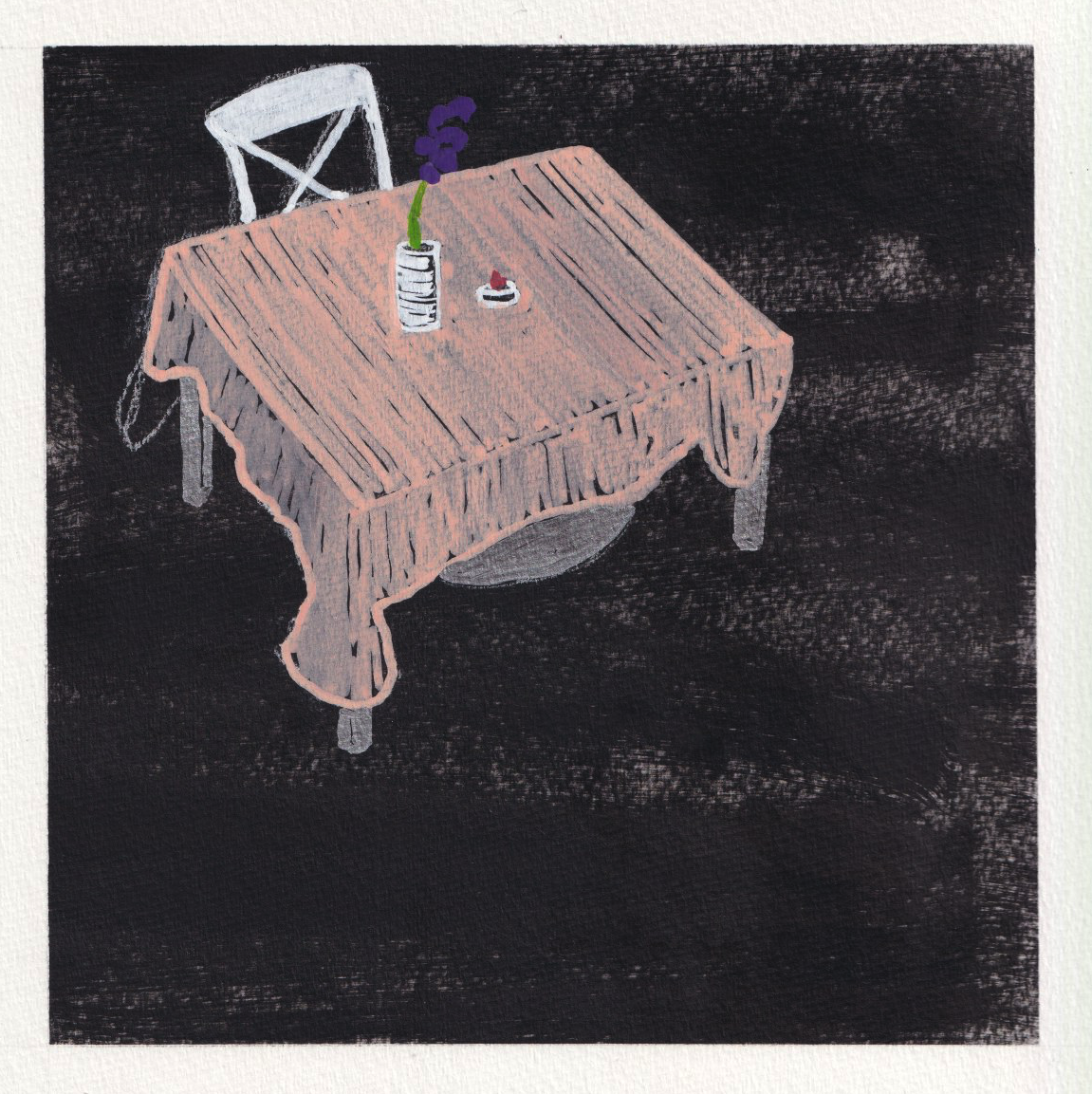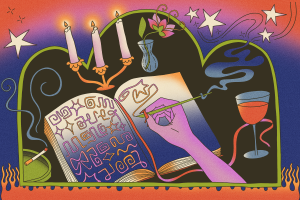This story has been translated and recorded in Spanish.
Listen to the English recording:
After the bell rings, I walk to the restaurant squeezed between two bare and luxurious boutiques. Every day, I wait for my father to clock-out from his shift. When it’s not busy, I pull the golden handle of the impenetrable and elegant stained glass front door and walk in. The maître d’ working today knows me and I wave as I sneak in through the front to avoid running into king size rats in the alley. I know to go straight upstairs and not go looking for my father. I go through the bar and into an elegant and large lounge filled with sofas and low bamboo tables. They are surrounded by palm trees that dress the entire restaurant. I sit among the satin cushions leaving the Chicago winter and feel the hot Vietnamese air. I hear croaking frogs and singing crickets. I know to stay low and not make a sound to prevent any danger. I am to be an invisible, silent little saola.
I spread my books across the tables and start on my homework. I breeze through biology and read a chapter from my 7th grade American History book. I don’t understand why the United States is so proud of all the wars they have won but I do everything to avoid Algebra. Trying to understand how letters and numbers live together in harmony is something I cannot accept. I try to focus as I rest comfortably on a luxurious green sofa and wonder about its origin. The tables, probably found somewhere in the Orient. I imagine how it all got here, more legally than I. With more rights to be kept safe, clean, and treasured. My life is somehow more dispensable than these foreign decorations.
The restaurant staff always bring me food when my father is busy. I get to eat the spring rolls with mint leaves and Asian basil that someone sent back or the mango sorbet someone rejected. If Mama Chef is in, I am in luck and get my favorite chicken fried rice and a little bowl of phở. Whenever my father has a break, he checks on me and brings me my cranberry soda with three maraschino cherries. I wait until the sun goes down and here it goes down early during the winter months. It has been three years since we arrived and I still can’t get used to the short Chicago days. There is nothing to do but be cold, eat, and watch TV, but I love American TV.
Usually at 4pm my father comes up to take me home before the dinner shift starts. Today is different from the other times. This time my dad has taken longer and I have fallen asleep. He comes upstairs to wake me and tells me to sit up and listen. He says, “Un ratito mas, we have to stay a little longer.” I groan knowing that this means way past midnight. He gracefully replies to silence my bratty complaint, “But, you can have dinner downstairs.” I rub my eyes as to check my hearing. I have never dined or eaten anything downstairs before. I wonder if it’s allowed, if he will get in trouble. He smiles as he reads my thoughts and says, “It’s okay.”
I am led downstairs by the hostess, leaving my books behind. I look over my shoulder, missing the comfort and safety of the lounge. She directs me to a small table for two, close to the wide, black trimmed windows that overlook Rush Street. There is milky-colored linen on every table announcing elegance and a purple orchid in a glass vase confirming status. I sit and take it all in. The lights are dimmed and a single tea candle is lit and burning just for me. I look up at my father with anxiety, he says, “I’ll bring you food,” knowing well that I am safe among the sweet and spicy.

As I wait for my refuge, I begin to notice the tiny details of where I am, a foreign world of formality and wealth. Women and men walking in with their minks and furs, long dark coats and leather gloves, handing them over to the polite coat girl as if they were regular rags. I notice my jeans and the rip where my knee peaks. I feel my polyester shirt and its cheapness itch my back. It cannot compare to the cashmere sweaters that softly lay on their bodies or the silk skirts that flow as they move across the room. I see polished shoes. Hear heels clacking bamboo floor. Sounding like Haiku. I cannot do anything but hide my salt stained shoes under the table in shame. I think, “¡Qué vergüenza!”
My anxiety and the panic that I do not belong, begin to seep in and boil over me. I begin to feel the heat rise from my heart to my cheeks and desperation to leave intensifies. At first, I think it would be best to run back upstairs to avoid the embarrassment. I worry that I will be called out and thrown out once they realize I have invaded their world. This makes me think of my history assignment on colonization. I realize the tables have turned, I can sit here and observe them. My curiosity overcomes my fears. Still, I watch them cautiously from a safe distance as I study this unknown world. I take notes with envy, observing their every move and sound. Their voices and laughs are different from my own. I try to grasp the concepts, slowly, as their language is lost to me. I can only hear the clinking of glasses followed by laughter. There is constant pouring of wine and fancy cocktails coming endlessly from every table, again, followed by the clinking of glasses and laughter. I conclude it is a ritual of acceptance.
My father arrives with food but this time it is unfamiliar. It isn’t like how he serves food to me at home or even upstairs at the lounge. He sets it on the table, placing his left hand behind his back, almost bowing. He plays his role as food runner with me and explains the contents of the plate in front of me. He treats me no different from the other customers. He winks at me and leaves me with plates of unworthiness. I realize this is the first time I see my father work at the restaurant. I always knew he worked as a food runner at the restaurant and was studying the wine list every night to become a waiter. Just now, I see for the first time, how he serves everyone. He walks with a fast graceful pace, waltzing across the floor with a large serving tray full of food, placing every item with the same elegance. He behaves like they are royalty and him, their subject. He speaks to them with reverence, limits eye contact, and bows to everyone with fearful respect of the power he knows they have over him tonight, and tonight, that includes me. I am his daughter, but feel undeserving. I wonder if it is necessary for each person to act so distinctly different from each other. Why does a server have to act so closely to a servant? Why does my father tolerate this? I realize he has to pretend every day. I wonder if anyone is ever rude, if he is scolded like a child. These thoughts anger me. They make me feel less by association. He is my father, he is their server and I am his daughter. I question what this means, if I must serve them too.
I see my father serving and bowing to them. Constantly saying, “Sir” and “Ma’am.” I see a man calling him as if he is my father’s momentary master. My father places plate after plate on their table. I hear their “oohs” and their “aahs” as my father explains to them the exoticism of their dish. He makes known the presence of the bird’s eye chili, the importance of the lime, explaining the lychee fruit in their drink, confirming the freshness of the crab in their salad, and highlighting the imported spices making each dish unique. It is the same food I have eaten before and know well what each dish tastes like. I find this notion amusing. I realize, they think they are the only ones who can afford to pleasure their taste buds by what I know is another stolen cuisine. An art taken from the kitchens of Vietnamese mamas, now sold by a white man to those who lust for culture.
I continue to watch as my father tends to their every need. A woman demands her water with no ice because it hurts her pearly teeth. I hear a man talking slowly to my father to make sure someone named Willet makes his drink. I see my father clearing their plates, cleaning up after them. At home I cannot leave the table until I clear it on my own. Now, I realize why and no longer resent the chore. My father, my hero and teacher, the Biologist who I witnessed teach mitosis and osmosis, now their peon. Now constantly apologizing, obediently running to them, and accepting their tip as their only thank you. My intense gaze makes my father turn around. He visits my little table after he gets someone’s order and asks me, “¿Quieres algo mas?” raising his eyebrows in mischief. I shrug trying to avoid giving any more demands. He nods and leaves me once again.
Soon after my father’s departure from my table, I begin to be treated like a princess. I am offered one delicacy after another. Each staff member brings a gift to my table as if their families are seated with me. In my present privilege, I enjoy and savor the many desserts arriving at my table. I close my eyes and take a bite of the raspberry custard with a chocolate center, covered in dark chocolate ganache and I quiver at its delight. I crack the perfectly browned sugary glass of the crème brûlée with my spoon and discover a perfect, soft filling. I take each bite like it is my last. I thank everyone that brings me a treat and I no longer feel unworthy. I begin to feel special and their hope for my enjoyment and pleasure fills me. I taste their hard work in every bite. I admire how their skillful hand crafted each dish. I sip on my last virgin mango Martini and bask in the gratefulness I was bestowed.
The restaurant is nearly empty. They take back their coats, their gloves and carry their leather purses and leave. I imagine for a moment what their homes look like, if anyone will greet them at the door and continue serving them. I imagine them arriving to a grand house filled with lavish furniture, exported rugs that cover the floors and crystal chandeliers that hang from their high ceilings. But I don’t know what happens to them after they leave their tip for my father to collect. I wonder if they are happy with all they own and if they are going home to someone they love, if they are good people, if they care for their own. I don’t know. The lights begin illuminating the restaurant, destroying the intimacy of my mind, and I snap back into reality. I see the staff finish clearing the tables, replacing the stained tablecloths, and resetting it all for the next day.
My father joins me, now changed into his jeans and thin jacket. He holds my backpack and his own over his shoulder. He hands me my jacket and offers to put it on. I refuse his help and do it myself. We leave the restaurant through the front door. As we cross the street my father asks me, “¿Did you like la cena?” I silently nod hoping my real thoughts will not escape and look away so my eyes will not betray me. My father then tells me something that calms my aching soul, “Es todo para ti.” What is “the all” he says is for me? I try to think, but we have to cross the street and we begin to run as we see the bus coming in the distance. As we run, the arctic wind burns my face and feathers begin to fill the sky. He reaches for my hand to help me run faster. My steps turn into hops and eventually leaps. We catch the bus and try to breathe and laugh simultaneously, celebrating our victory. I surf the bumpy bus ride and make my way to find a seat. I see other men and women sitting among us. I see their heavy eyes, some with a bowed head fighting sleep. I think they are mamas and papas too. I wonder what job they do and think of who they work for, not their bosses or who they serve, but who they love.
Featured Image: An illustration of a small table with one white chair. A milky-colored linen is draped on top of the table with a purple orchid in a glass vase sitting on top. The illustration is set on top of a textured black background. Illustration by Damiane Nickles.
Why Short Latina?
The anonymity of my work is the control that I have over my identity. It is the product of my immigrant status in this country and at first, the shame and pain that carried my stories. The name Short Latina was born from my love for short stories and Latina from the inability to fully identify Mexican or American. My first works and blog posts can be found at shortlatinastories.com.



